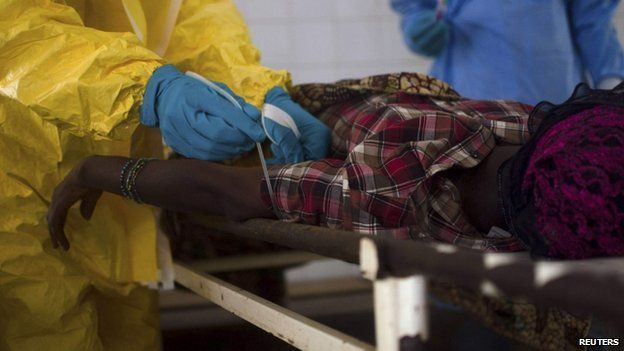Ebola outbreak: Sierra Leone escaped patient dies
- Published

A Sierra Leone woman who fled hospital after testing positive for the Ebola virus has died after turning herself in, health officials have told the BBC.
Her family had forcibly removed her from a public hospital on Thursday.
Saudatu Koroma's is the first case of Ebola to be confirmed in the country's capital Freetown, where there are no facilities to treat the virus.
Since February, more than 660 people have died of Ebola in West Africa - the world's deadliest outbreak to date.
Nigeria has put all its entry points on red alert after confirming the death there of a Liberian man who was carrying the highly contagious virus.
The man died after arriving at Lagos airport on Tuesday, in the first Ebola case in Africa's most populous country.
The outbreak began in southern Guinea and spread to Liberia and Sierra Leone.
Reports on Saturday said that a prominent Liberian doctor, Samuel Brisbane, had died after a three-week battle with the virus.
And later it emerged that a US doctor working with Ebola patients, Kent Brantly, was being treated for the virus in a hospital in the capital Monrovia.
Street protest
The virus, which kills up to 90% of those infected, spreads through contact with an infected person's bodily fluids.
Patients have a better chance of survival if they receive treatment early.
Ms Koroma was the first registered Ebola case in the capital Freetown.
Both she and her parents - who are suspected of having the virus - had been taken to Ebola treatment centres in the east of the country, health ministry spokesman Sidi Yahya Tunis told the BBC.
Ebola virus disease (EVD)
- Symptoms include high fever, bleeding and central nervous system damage
- Fatality rate can reach 90%
- Incubation period is two to 21 days
- There is no vaccine or cure
- Supportive care such as rehydrating patients who have diarrhoea and vomiting can help recovery
- Fruit bats are considered to be the natural host of the virus
The woman had been one of dozens of people who tested positive but were unaccounted for, the BBC's Umaru Fofana reports from the capital, Freetown.
Her case highlights Sierra Leone's lack of preparedness in responding to the outbreak, our correspondent says, with no laboratory or treatment centre in Freetown.
The Ebola cases in Sierra Leone are centred in the country's eastern districts of Kenema and Kailahun, just over the border from the Guekedou region of Guinea where the outbreak started.
Police said thousands of people joined a street protest in Kenema on Friday over the government's handling of the outbreak.
Earlier this week, it was announced that the doctor leading Sierra Leone's fight against Ebola was being treated for the virus.
On Thursday, the World Health Organization said that 219 people had died of Ebola in Sierra Leone.
Meanwhile, in Nigeria, the health minister Onyebuchi Chukwu said that all other passengers on board the flight with the infected man had been traced and were being monitored.
The patient had "avoided contact with the general public" between the airport and the hospital, he said.
"All ports of entry to Nigeria, including airports, sea ports and land borders have been placed on red alert," he added.
WHO: West Africa Ebola outbreak figures as of 24 July
- Guinea - 314 deaths, 415 cases
- Liberia - 127 deaths, 224 cases
- Sierra Leone - 219 deaths, 454 cases
- Published18 July 2014
- Published8 October 2014
- Published13 November 2014
- Published1 July 2014
- Published24 April 2014
- Published1 April 2014